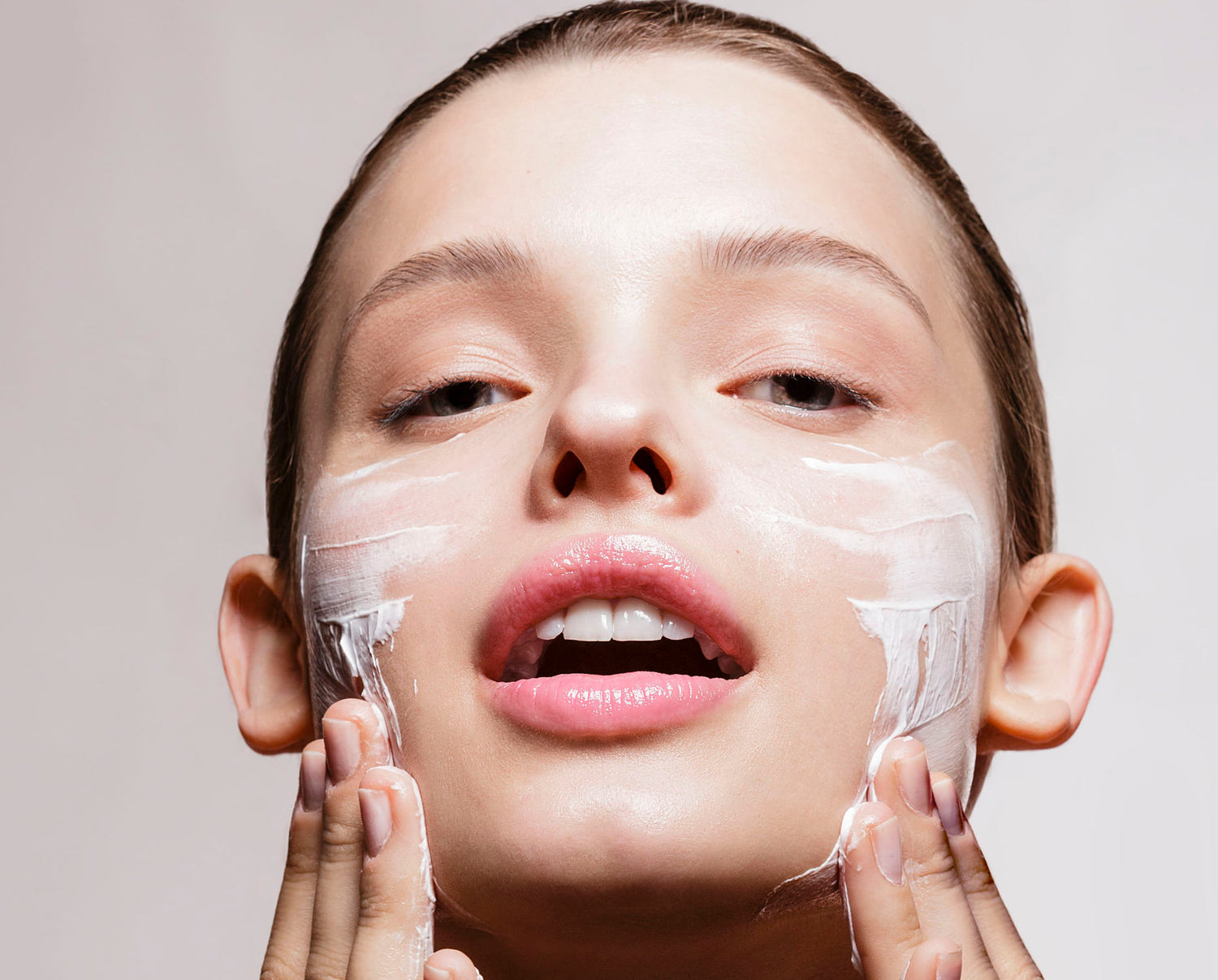Key Takeaways
- After stopping the pill, many women* notice a deterioration in the appearance of their skin.
- You can combat and prevent blemishes with diet and the right skin care.
- However, depending on the severity, it may be worth seeking medical advice.
The effect of hormones on skin is a topic which is concerning women more and more. Fear of blemishes after discontinuing the pill in particular is a reason many women continue taking the pill for the time being. Important: Every woman reacts differently to discontinuing the pill and even if problems occur, there are many tips and tricks to counteract them. For this reason, we sat down with hormone expert Sina Oberle from "Generation Pille" and asked her a few exciting questions about hormone balance:
What is the importance of hormones for the skin?
Hormones have an effect on the entire female body, including the skin. Many women may be familiar with their skin being tight and beautiful during the first phase of the cycle, only to turn bland and blemished later on. This is due to hormonal changes. In the first phase, the hormone estrogen dominates. It ensures that more water gets into the skin, making it look more radiant. In the second phase of the cycle, the estrogen decreases and thus the elasticity of the skin can also decrease.
What hormonal changes take place over the course of a woman's life and how do they change the skin's appearance?
Hormonal changes in the female body begin at puberty and end with the menopause. In between, women are fertile and cyclical. The sex hormones progesterone, estrogen and also testosterone have a special influence in this important phase of a woman’s life. During puberty, the sex hormones begin to kick in for the first time. This also means that teenage girls are more likely to suffer from blemished skin. Some girls need three to four years for their sex hormones to settle down and for their skin to improve. Until menopause, the female body is all about fertility. In every cycle, the female body prepares for ovulation and is in the starting blocks for a fertilized egg to implant. If fertilization does not take place, the lining of the uterus breaks down again, the period starts and everything begins again. This complete process is essential for women and everything is regulated and controlled by sex hormones. It is important to note that blemished skin is not normal during this phase. Blemish-prone skin is always a sign that something in the body is out of balance. With the menopause, the production of sex hormones also decreases, which in turn can have an effect on the skin. If a woman's hormone balance drops too drastically as she ages, the skin can become duller and also more susceptible to external pollutants.
What effect does stopping the pill have on the skin?
As well as a contraceptive, many women know and use the pill as a beauty supplement, or “pure skin” drug. This effect cannot be concealed in some pill preparations. Due to their anti-androgenic effect, they inhibit the production of sebum in the body. A simple formula: Less sebum, fewer pimples. After stopping, the skin can get a little confused, sebum production is cranked up again and pimples appear. If your skin is blemished after stopping the pill, you should look at different factors. For example, the intestines and liver can also be put under stress by the pill. These two organs, which help detoxify the body, are also closely related to our skin health. It is important to know that the pill does not fight the cause of blemished skin, but can only suppress the symptoms. This is why blemished skin after stopping the pill often affects women who were prescribed the pill during puberty due to acne or pimples. It never solved the original cause, but only covered up and postponed it.
How can skin care be adjusted to hormone levels and cycle phase?
Nutrition is especially important before and during the period. Lots of green vegetables, fresh berries and healthy fats in particular help promote healthy skin during this phase due to their nutrients . They may also help avoid pus and inflamed pimples before and during the period. After the period, that is, in the first phase of the natural cycle, is when most women will experience their skin at its clearest and most beautiful. Now is the best time to try out new skincare products, rather than during the second half of your cycle, for example, when your skin is more vulnerable. After ovulation, estrogen levels decrease and less water is transported into the skin. This can make it appear duller and saggier. Again, you can support your skin from the inside as well as the outside. Drink plenty of fluids, preferably three liters a day. Due to its high moisture and deep penetrating effect, a 100 percent pure aloe vera gel is also suitable during this phase.
Is it worth investing in cosmetic treatment?
If it's done well, definitely. A professional cleansing can help the skin rid itself of sebum buildup. When choosing the right skincare specialist, it comes down to a few points: What kind of skincare products do they use? And how do they work? The choice of products should always be natural. It is also important that pimples are not aggressively pressed and squeezed, but the cleansing is done gently, otherwise inflammation may occur in the lower layer of the skin and scars may form. A good and professional beautician knows this.
At what point should you consider acne treatment with medication?
Impure skin can never be treated from the outside alone. The body is holistic and should be treated as such. This means finding the root cause of impure skin. Is it the intestines? The liver? Too much stress? The diet? This can be tedious at first, but once you have found the answer, your skin will also improve.
When should you go to the doctor about skin blemishes?
Every woman can decide that for herself. She can still get advice from a doctor before stopping the pill. My experience often showed that doctors advise a drug treatment, back to the pill or cortisone creams. I personally doubt whether this is effective. Going to a holistic doctor or alternative practitioner can often be more helpful here, as these doctors help you to find the root cause of blemished skin.
What are the top 3 home remedies that help with blemishes?
Essential oils are sensational against blemished and inflamed skin. I can recommend tea tree oil, juniper berry or lavender.
A healing clay can work wonders and soothe the skin. In combination with a skin-friendly essential oil, it creates a wonderful and inexpensive face mask.
The fresh gel of the aloe vera plant provides the skin with a lot of moisture and can penetrate deep into the lower layers of the skin thanks to its active ingredients.
What should and should not be on the shopping list for hormonal skin blemishes?
Do’s:
Legumes (lentils, beans, peas)
Flaxseeds: Due to their fiber they are especially good for our intestines.
Fermented foods like sauerkraut can help the gut build up its intestinal flora.
Bitter substances from gentian, artichoke and dandelion are wonderful for the liver and stimulate the production of bile acid
Healthy fats such as linseed oil, wild-caught salmon, and nuts contain omega 3 which is essential for relieving inflammation
Don’ts:
Dairy products, as they have been shown to stimulate sebum production in the body.
Sugary foods that upset the intestinal environment and allow the bad bacteria to flourish.

